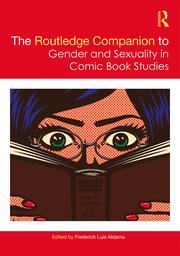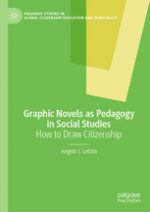Monitor is an irregularly published overview of publications from the previous six months that may be of relevance to comics studies scholars. The introductory texts are the respective publishers’. Do you have suggestions or information on new releases that have been overlooked and should be introduced on our website? Please let us know via email: redaktion@comicgesellschaft.de.
→ See previous Monitor posts.
 The Routledge Companion to Gender and Sexuality in Comic Book Studies
The Routledge Companion to Gender and Sexuality in Comic Book Studies
Routledge Companions to Gender
Frederick Luis Aldama (ed.)
Routledge
594 pages
August 2020
Publisher’s website
“The Routledge Companion to Gender and Sexuality in Comic Book Studies is a comprehensive, global, and interdisciplinary examination of the essential relationship between Gender, Sexuality, Comics, and Graphic Novels.
A diverse range of international and interdisciplinary scholars take a closer look at how gender and sexuality have been essential in the evolution of comics, and how gender and sexuality in comics demand that we re-frame and re-view comics history. Chapters cover a wide array of intersectional topics including Queer Underground and Alternative comics, Feminist Autobiography, re-drawing disability, Latina testimony, and re-evaluating the critical whiteness and masculinity of superheroes in this first truly global reference text to gender and sexuality in comics.
Comics have always been an important place for the radical exploration of feminist and non-binary sexualities and identities, and the growth of non-normative comic book traditions as a field of inquiry makes this an essential text for upper-level undergraduates, postgraduates, and researchers studying Comics Studies, Women’s and Gender Studies, Literary Studies, and Cultural Studies.”
 Krieg und Migration im Comic: Interdisziplinäre Analysen
Krieg und Migration im Comic: Interdisziplinäre Analysen
Edition Kulturwissenschaft
icon Düsseldorf (eds.)
transcript
310 pages
August 2020
Publisher’s website
With contributions by several ComFor members!
“Freund oder Feind? Eigenes oder Fremdes? Graphische Erzählungen brechen vorstrukturierte binäre Wahrnehmungsmuster auf. Krieg und Migration zählen schon seit den Anfängen des Comics zum Kernbestand des Genres und sind im Zuge der politischen Instabilitäten der 2010er Jahre erneut in den Fokus vieler Werke gerückt. Das Spektrum reicht hierbei von dokumentarischen Comics bis zur fiktionalen Ausgestaltung von Einzelschicksalen. Aus unterschiedlichen Fachperspektiven analysieren die Beiträger_innen daher die Erzählstrategien von Comics über Krieg und Migration sowie deren Analogien und Differenzen zu verwandten Medien wie Literatur, bildende Kunst, Fotografie und Film.”
 Webcomics
Webcomics
Bloomsbury Comics Studies
Sean Kleefeld
Bloomsbury
272 pages
June 2020
Publisher’s website
“The first critical guide to cover the history, form and key critical issues of the medium, Webcomics helps readers explore the diverse and increasingly popular worlds of online comics.
In an accessible and easy-to-navigate format, the book covers such topics as:
- The history of webcomics and how developments in technology from the 1980s onwards presented new opportunities for comics creators and audiences
- Cultural contexts – from the new financial and business models allowed by digital media to social justice causes in contemporary webcomics
- Key texts – from early examples of the form such as Girl Genius and Penny Arcade to popular current titles such as Questionable Content and Dumbing of Age
- Important theoretical and critical approaches to studying webcomics
Webcomics includes a glossary of crucial critical terms, annotated guides to further reading, and online resources and discussion questions to help students and readers develop their understanding of the genre and pursue independent study.”
 Graphic Novels as Pedagogy in Social Studies
Graphic Novels as Pedagogy in Social Studies
Palgrave Studies in Global Citizenship Education and Democracy
Angelo J. Letizia
Palgrave
238 pages
April 2020
Publisher’s website
“This book examines the study of citizenship by means of reading and creating graphic novels and comics in the social studies classroom. The author argues that utilizing graphic novels in the classroom not only helps to teach important concepts, skills, and dispositions of the social studies, but can also empower students with the means to grapple with the complexities of our current times. From the primary school classroom through high school and beyond, graphic novels provide a rich platform to explore a diverse array of issues such as history, critical geography, gender, race and ethnicity, disability, leadership, feminism, sexual identity, philosophy, and social justice issues, as well as provide a multidisciplinary lens for discourse on citizenship. Cultivating multimodal literacy skills through graphic novels allows students and instructors to conceive of and practice citizenship in new, unforeseen ways in an era where truth is in question. To drive this point forward, the author includes examples of both his own and his students’ work, along with exercises to be used in social studies classrooms.”
 Understanding Genre in Comics
Understanding Genre in Comics
Palgrave Studies in Comics and Graphic Novels
Nicolas Labarre
Palgrave
157 pages
April 2020
Publisher’s website
“This book offers a theoretical framework and numerous case studies – from early comic books to contemporary graphic novels – to understand the uses of genres in comics. It begins with the assumption that genre is both frequently used and undertheorized in the medium. Drawing from existing genre theories, particularly in film studies, the book pays close attention to the cultural, commercial, and technological specificities of comics in order to ground its account of the dynamics of genre in the medium. While chronicling historical developments, including the way public discourses shaped the horror genre in comics in the 1950s and the genre-defining function of crossovers, the book also examines contemporary practices, such as the use of hashtags and their relations to genres in self-published online comics.”